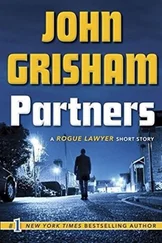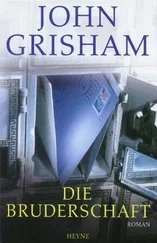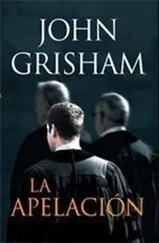John Grisham - Chamber
Здесь есть возможность читать онлайн «John Grisham - Chamber» весь текст электронной книги совершенно бесплатно (целиком полную версию без сокращений). В некоторых случаях можно слушать аудио, скачать через торрент в формате fb2 и присутствует краткое содержание. Жанр: Триллер, на английском языке. Описание произведения, (предисловие) а так же отзывы посетителей доступны на портале библиотеки ЛибКат.
- Название:Chamber
- Автор:
- Жанр:
- Год:неизвестен
- ISBN:нет данных
- Рейтинг книги:4 / 5. Голосов: 1
-
Избранное:Добавить в избранное
- Отзывы:
-
Ваша оценка:
- 80
- 1
- 2
- 3
- 4
- 5
Chamber: краткое содержание, описание и аннотация
Предлагаем к чтению аннотацию, описание, краткое содержание или предисловие (зависит от того, что написал сам автор книги «Chamber»). Если вы не нашли необходимую информацию о книге — напишите в комментариях, мы постараемся отыскать её.
Chamber — читать онлайн бесплатно полную книгу (весь текст) целиком
Ниже представлен текст книги, разбитый по страницам. Система сохранения места последней прочитанной страницы, позволяет с удобством читать онлайн бесплатно книгу «Chamber», без необходимости каждый раз заново искать на чём Вы остановились. Поставьте закладку, и сможете в любой момент перейти на страницу, на которой закончили чтение.
Интервал:
Закладка:
Against the brick wall was an aluminum table with a television on it. Adam sat on the sofa, nude except for boxer shorts, holding the remote control. But for the colorless radiation from the screen, the loft was dark. It was after midnight. The video was one he'd pieced together over the years - The Adventures of a Klan Bomber, he called it. It started with a brief news report filed by a local crew in Jackson, Mississippi, on March 3, 1967, the morning after a synagogue was leveled by a bomb blast. It was the fourth known attack against Jewish targets in the past two months, the reporter said as a backhoe roared behind her with a bucket full of debris. The FBI had few clues, she said, and even fewer words for the press. The Klan's campaign of terror continues, she declared gravely, and signed off.
The Kramer bombing was next, and the story started with sirens screaming and police pushing people away from the scene. A local reporter and his cameraman were on the spot quickly enough to capture the initial bedlam. People were seen running to the remains of Marvin's office. A heavy cloud of gray dust hung above the small oak trees on the front lawn. The trees were battered and leafless, but standing. The cloud was still and showed no signs of dissipating. Off camera, voices yelled about a fire, and the camera rocked along and stopped in front of the building next door where thick smoke poured from a damaged wall. The reporter, breathless and panting into the microphone, jabbered incoherently about the entire shocking scene. He pointed over here, then over there as the camera jerked in belated response. The police pushed him away, but he was too excited to care. Glorious pandemonium had erupted in the sleepy town of Greenville, and this was his grand moment.
Thirty minutes later, from a different angle, his voice was somewhat calmer as he described the frantic removal of Marvin Kramer from the rubble. The police extended their barricades and inched the crowd backward as the fire and rescue people lifted his body and worked the stretcher through the wreckage. The camera followed the ambulance as it sped away. Then, an hour later and from still another angle, the reporter was quite composed and somber as the two stretchers with the covered little bodies were delicately handled by the firemen.
The video cut from the footage of the bombing scene to the front of the jail, and for the first time there was a glimpse of Sam Cayhall. He was handcuffed and ushered quickly into a waiting car.
As always, Adam pushed a button and replayed the brief scene with the shot of Sam. It was 1967, twenty-three years ago. Sam was forty-six years old. His hair was dark and cut close, the fashion of the times. There was a small bandage under his left eye, away from the camera. He walked quickly, stride for stride with the deputies because people were watching and taking pictures and yelling questions. He turned only once to their voices, and, as always, Adam froze the tape and stared for the millionth time into the face of his grandfather. The picture was black and white and not clear, but their eyes always met.
Nineteen sixty-seven. If Sam was forty-six, then Eddie was twenty-four, and Adam was almost three. He was known as Alan then. Alan Cayhall, soon to be a resident of a distant state where a judge would sign a decree giving him a new name. He had often watched this video and wondered where he was at the precise, moment the Kramer boys were killed: 7:46 A.M., April 21, 1967. His family lived at that time in a small house in the town of Clanton, and he was probably still asleep not far from his mother's watch. He was almost three, and the Kramer twins were only five.
The video continued with more quick shots of Sam being led to and from various cars, jails, and courthouses. He was always handcuffed, and he developed the habit of staring at the ground just a few feet in front of him. His face bore no expression. He never looked at the reporters, never acknowledged their inquiries, never said a word. He moved quickly, darting out of doors and into waiting cars.
The spectacle of his first two trials was amply recorded by daily television news reports. Over the years, Adam had been able to retrieve most of the footage, and had carefully edited the material. There was the loud and blustering face of Clovis Brazelton, Sam's lawyer, holding forth for the press at every opportunity. But the clips of Brazelton had been edited quite heavily, with time. Adam despised the man. There were clear, sweeping shots of the courthouse lawns, with the crowds of silent onlookers, and the heavily armed state police, and the robed Klansmen with their coneheads and sinister masks. There were brief glimpses of Sam, always in a hurry, always shielding himself from the cameras by ducking along behind a beefy deputy. After the second trial and the second hung jury, Marvin Kramer stopped his wheelchair on the sidewalk in front of the Wilson County Courthouse, and with tears in his eyes bitterly condemned Sam Cayhall and the Ku Klux Klan and the hidebound justice system in Mississippi. As the cameras rolled, a pitiful incident unfolded. Marvin suddenly spotted two Klansmen in white robes not far away, and began screaming at them. One of them yelled back, but his reply was lost in the heat of the moment. Adam had tried everything to retrieve the Klansman's words from the air, but with no luck. The reply would be forever unintelligible. A couple of years earlier, while in law school at Michigan, Adam had found one of the local reporters who was standing there at the moment, holding a microphone not far from Marvin's face. According to the reporter, the reply from across the lawn had something to do with their desire to blow off the rest of Marvin's limbs. Something this crude and cruel appeared to be true because Marvin went berserk. He screamed obscenities at the Muckers, who were easing away, and he spun the metal wheels of his chair, lunging in their direction. He was yelling and cursing and crying. His wife and a few friends tried to restrain him, but he broke free, his hands furiously working the wheels. He rolled about twenty feet, with his wife in chase, with the cameras recording it all, until the sidewalk ended and the grass began. The wheelchair flipped, and Marvin sprawled onto the lawn. The quilt around his amputated legs flung free as he rolled hard next to a tree. His wife and friends were on him immediately, and for a moment or two he disappeared into a small huddle on the ground. But he could still be heard. As the camera backed away and shot quickly at the two Klansmen, one doubled over with laughter and one frozen in place, an odd wailing erupted from the small crowd on the ground. Marvin was moaning, but in the shrill, high-pitched howl of a wounded madman. It was a sick sound, and after a few miserable seconds of it the video cut to the next scene.
Adam had tears in his eyes the first time he watched Marvin roll on the ground, howling and groaning, and though the images and sounds still tightened his throat, he had stopped crying long ago. This video was his creation. No one had seen it but him. And he'd watched it so many times that tears were no longer possible.
Technology improved immensely from 1968 to 1981, and the footage from Sam's third and last trial was much sharper and clearer. It was February of 1981, in a pretty little town with a busy square and a quaint courthouse of red brick. The air was bitterly cold, and perhaps this kept away the crowds of onlookers and demonstrators. One report from the first day of the trial had a brief shot of three behooded Klansmen huddled around a portable heater, rubbing their hands and looking more like Mardi Gras revelers than serious hoodlums. They were watched by a dozen or so state troopers, all in blue jackets.
Because the civil rights movement was viewed by this time as more of a historical event than a continuing struggle, the third trial of Sam Cayhall attracted more media than the first two. Here was an admitted Klansman, a real live terrorist from the distant era of Freedom Riders and church bombings. Here was a relic from those infamous days who'd been tracked down and was now being hauled to justice. The analogy to Nazi war criminals was made more than once.
Читать дальшеИнтервал:
Закладка:
Похожие книги на «Chamber»
Представляем Вашему вниманию похожие книги на «Chamber» списком для выбора. Мы отобрали схожую по названию и смыслу литературу в надежде предоставить читателям больше вариантов отыскать новые, интересные, ещё непрочитанные произведения.
Обсуждение, отзывы о книге «Chamber» и просто собственные мнения читателей. Оставьте ваши комментарии, напишите, что Вы думаете о произведении, его смысле или главных героях. Укажите что конкретно понравилось, а что нет, и почему Вы так считаете.











